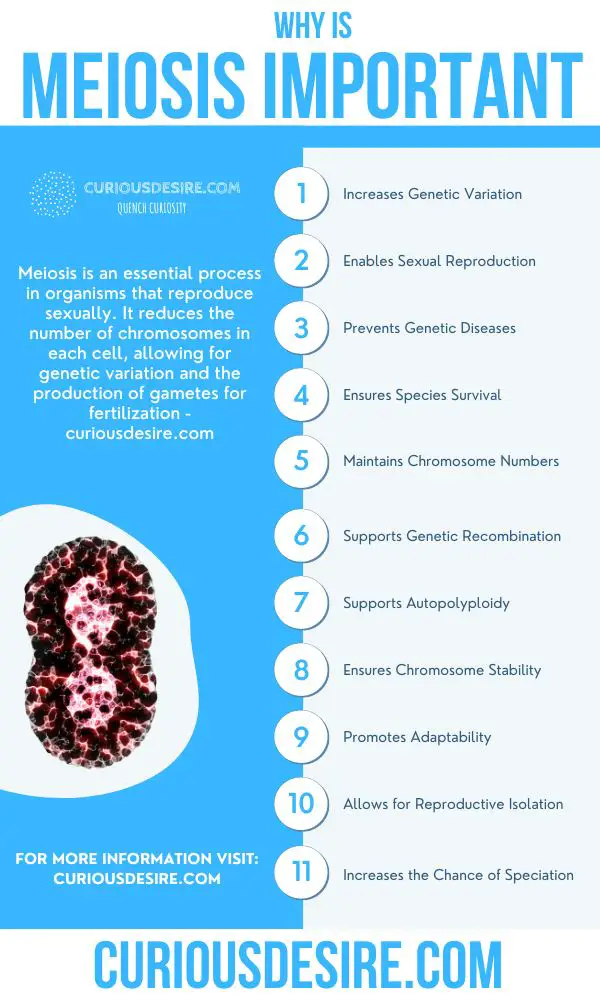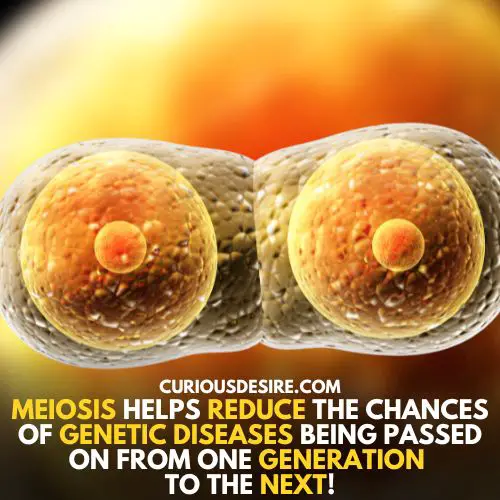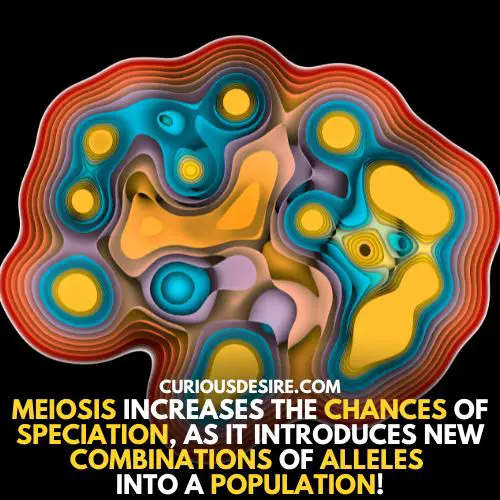Meiosis is an essential process in organisms that reproduce sexually. It reduces the number of chromosomes in each cell, allowing for genetic variation and the production of gametes for fertilization. It is an important part of the life cycle that allows for sexual reproduction.
In this article, we’ll discuss 19 reasons why is meiosis important.
19 Benefits of Meiosis
Meiosis is a process of cell division that reduces the number of chromosomes in each cell and helps create genetic variation. This is an important part of the life cycle for organisms that reproduce sexually.
Here are 19 reasons why is meiosis is important.
1. It Increases Genetic Variation
Meiosis produces offspring with different combinations of genetic material from their parents, meaning they have unique characteristics that can be beneficial to their survival.
This process helps ensure that populations remain diverse, which can give them a better chance of surviving changing environments. It also helps create new traits that can be passed down from one generation to the next.

2. It Enables Sexual Reproduction
Meiosis enables sexual reproduction by reducing the number of chromosomes in each gamete, allowing for fertilization to occur. This process is essential for species to be able to reproduce and pass on genetic material from one generation to the next.
During meiosis, homologous chromosomes pair up and exchange genetic material, meaning that offspring will have a mix of genetic material from both parents.
3. Meiosis Prevents Genetic Diseases
Meiosis helps reduce the chances of genetic diseases being passed on from one generation to the next. This is due to the fact that during meiosis, chromosomes within a cell are reduced in number, resulting in new combinations of genes.
Consequently, it creates greater genetic diversity and reduces the likelihood of a single gene spelling disaster – which would be the case if the same set of genes was inherited from both parents.

During meiosis, chromosomes exchange genetic material, resulting in offspring that possess different combinations of genes than their parents. This reduces the chance of recessive alleles (genes) causing genetic disorders in new generations.
4. Meiosis Ensures Species Survival
Meiosis is essential for species survival, as it allows for genetic variation to occur and for sexual reproduction to take place.
Without meiosis, populations would become increasingly homogeneous with each generation, which could lead to the extinction of a species. It is an essential process for the survival of many species.
5. It Maintains Chromosome Numbers
Meiosis helps ensure that each new generation has the same number of chromosomes as its parents. During meiosis, pairs of chromosomes are separated and distributed into daughter cells so that they can be passed on to future generations. This ensures chromosomal balance and consistency in succeeding generations.
Due to this process, generations can remain genetically similar to one another and maintain a consistent number of chromosomes. This is essential for species survival and allows for genetic variation.
6. It Supports Genetic Recombination
Meiosis allows for genetic recombination, which is the exchange of genetic material between chromosomes. This helps introduce new combinations of alleles (genes) into a population, creating greater diversity and increasing the chances of successful reproduction.
It can also give species a better chance of surviving changing environments, as the new combinations of genes can be beneficial to their survival.
7. It Ensures Balanced Chromosome Segregation
Meiosis ensures that the number of chromosomes in each gamete is balanced and even. Without meiosis, gametes could have an uneven number of chromosomes, which would lead to imbalances in the chromosome numbers of offspring.
Meiosis can prevent these imbalances, as homologous chromosomes are separated and distributed into different gametes. This ensures that the chromosome number of each gamete is even, which is essential for successful fertilization.
8. It Supports Autopolyploidy
Meiosis allows for autopolyploidy or the production of gametes with multiple sets of chromosomes from a single parent. This can be beneficial for species that reproduce asexually, as it allows them to produce offspring with more genetic diversity.
It can also be beneficial for species that reproduce sexually, as it can increase the chances of successful fertilization and produce offspring with greater genetic diversity.
9. It Ensures Chromosome Stability
Meiosis helps maintain chromosome stability within a species and prevents chromosomes from becoming too large or complex. During meiosis, pairs of chromosomes are separated into daughter cells so they can be passed on to future generations. This helps keep chromosomes in check and prevents them from becoming oversized or too complex to reproduce properly.
Meiosis is essential for maintaining chromosomal stability and ensuring a species can survive changing environments. It is an important process that helps ensure the survival of many species.
10. It Promotes Adaptability
Meiosis increases the chances of a species adapting to new environments as it introduces new combinations of alleles (genes) into a population. This allows populations to become more diverse, which can give them an advantage when it comes to adapting to changing conditions.
It will also increase the chances of successful reproduction, as different combinations of alleles can be beneficial for survival in new environments. Meiosis is essential for a species’ adaptability and survival.
11. It Allows for Reproductive Isolation
Meiosis helps keep species separate from one another, as it increases the chances of reproductive isolation occurring between different populations.
By producing offspring with unique genetic combinations, meiosis makes it more difficult for members of different species to interbreed. This helps keep species distinct from one another and prevents hybridization from occurring.
12. It Increases the Chance of Speciation
Meiosis also increases the chances of speciation occurring, as it introduces new combinations of alleles (genes) into a population. This increases the genetic diversity within a species, which can make it more difficult for members of different species to interbreed and results in the formation of new species.

13. It Promotes Diversity
Meiosis promotes diversity by introducing new combinations of alleles (genes) into populations. This allows species to become more diverse and better able to adapt to changing environments.
Additionally, it prevents the accumulation of recessive traits that can cause genetic disorders in future generations.
14. It Supports Asexual Reproduction
Meiosis also supports asexual reproduction, as it allows for autopolyploidy or the production of gametes with multiple sets of chromosomes from a single parent.
It helps ensure that offspring have the same genetic makeup as their parents and can be beneficial for species that reproduce asexually.
15. It Facilitates Evolution
Meiosis is essential for evolution to take place. By introducing new combinations of alleles (genes) into a population, meiosis allows populations to become more diverse and better equipped to adapt to changing environments. This helps ensure the survival of species over time and keeps them from going extinct.
16. It Ensures the Continuity of Generations
Meiosis is essential for the continuity of generations, as it allows reproductive cells to be passed down from one generation to the next. This helps ensure that species are able to survive over time and can adapt to changing environments.
17. It Produces Offspring with Variations
Meiosis produces offspring with variations in their genetic makeup, which can help ensure the survival of a species.
By introducing new combinations of alleles (genes) into a population, meiosis allows species to become more diverse and better equipped to adapt to changing environments. This helps keep them from going extinct over time.
18. It Produces Haploid Cells
Meiosis is an essential process in sexual reproduction, as it produces haploid cells that are necessary for successful fertilization and the formation of a diploid zygote. Haploid cells contain only one copy of each chromosome, which provides the genetic diversity needed to create offspring with unique combinations of genes and alleles.
Without meiosis, a species would be unable to reproduce sexually and could face extinction. Meiosis is essential for the survival of many species.
19. It Promotes Genetic Diversity
Lastly, meiosis promotes genetic diversity by introducing new combinations of alleles (genes) into a population. This helps keep species distinct from one another and increases the chances of them adapting to changing environments, which can help ensure their survival over time.
Conclusion
Meiosis is an essential process for sexual reproduction, as it produces haploid cells and increases the chances of genetic diversity in a population. Additionally, meiosis helps prevent hybridization between species, increases the chance of speciation occurring, and promotes the continuity of generations over time.
Without meiosis, many species would not be able to survive and reproduce, and the diversity of life on Earth would be greatly reduced. In short, meiosis is an essential process for the survival and continuity of species over time.